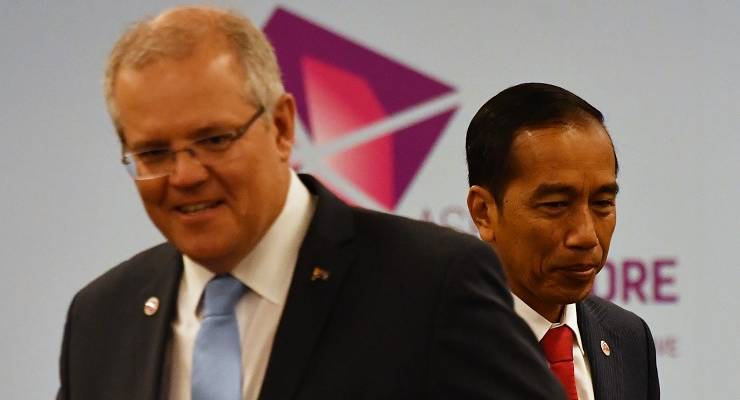
When the Indonesia-Australia free trade agreement — officially known as the Comprehensive Economic Partnership Agreement — galloped through the Joint Standing Committee on Treaties with bilateral support (bar a few “tweaks” from Labor) last month, it seemed to be ready-set-go.
The deal, which was inked just in time for the May elections in both countries, is something of a win for Canberra. It’s been on our government’s wishlist for some time, and finally caught the eye of Indonesian President Joko Widodo, who normally gives us little attention (unlike his Australia-loving predecessor).
Unlike the preferential trade deal previously opted for by the Productivity Commission, a free trade agreement — however limited — is a better way for Australia to formally engage the target nation.
The Indonesian deal was always underpinned by Canberra’s security imperative. While people familiar with the free trade deal say it will only help the quantum of trade around the edges, Indonesia remains highly protectionist, riddled with corruption and is a significant export competitor in resources and agriculture. That’s why the trade and political elite in Canberra see this new agreement as a huge win.
The conga line of recent Coalition PMs haven’t agreed on much except the notion that Indonesia is Australia’s most important trade relationship, which must make Widodo’s shoulder-shrugging attitude towards us particularly galling. His attentions have been far more occupied by China (no surprise there) and the Arab states, lead by the Saudis, who have showered billions on Islamic Asia and opened their doors to their migrant workers.
The ALP “tweaks” on the trade deal have to do with the migrant labour provisions for Indonesia. The unions are up in arms, because they fear the deal will lead to an influx of cheap Indonesian labour into Australia that will hurt local workers and undermine Australian working conditions.
Whether the new Labor party will go into bat for workers, like the ALP of old, is unclear (and a bet no one would make). But there are some MPs (old school ones) that are kicking up a stink about the deal. It’s another test for Anthony Albanese, neatly representing the difficulties he has in reconciling his past (and heart) and his present.
But, apart from the fractured Australian labour movement, the deal also faces a different, and likely sterner foe: the Indonesian parliament itself. For his second term, Widodo has cobbled together a nominally decent majority of about 60%, but it’s a large, unwieldy coalition of diverse vested interests and political coalitions.
Indonesia’s strong protectionism, as well as Widodo’s own economically-flawed but politically-popular policy of self-reliance, are already huge hurdles for the deal.
Pork-barrelling (or whatever it might be called in the world’s largest Muslim nation) is also a strong fixture in Indonesian politics and Indonesia’s powerful business aristocracy will use their political and economic leverage to “tweak” anything they might view as competition. Adding a further degree of difficulty is the phalanx of freshly elected snouts in the trough, who will be determined not to miss their turn in adding a further layer of opposition.
There would have to be question marks over Widodo’s unwavering support of the deal if the process presents as politically problematic. He has a track record of dodging fights and making political compromises, as evidenced by the especially underwhelming quality, and lack of suitability, of his Cabinet choices — but that’s another story.
The elevation of his two-time presidential rival and accused humans rights abuser, Prabowo Subianto, as his defence minster, strongly suggests that too many compromises have already been made to bother too much with an Australian deal that is, in the end, no real game-changer for Indonesia.
What do you think about the state of Australia’s foreign affairs? Let us know your thoughts at boss@crikey.com.au. Please include your full name if you would like to be considered for publication.








Crikey is committed to hosting lively discussions. Help us keep the conversation useful, interesting and welcoming. We aim to publish comments quickly in the interest of promoting robust conversation, but we’re a small team and we deploy filters to protect against legal risk. Occasionally your comment may be held up while we review, but we’re working as fast as we can to keep the conversation rolling.
The Crikey comment section is members-only content. Please subscribe to leave a comment.
The Crikey comment section is members-only content. Please login to leave a comment.